About Maine History Online

A Maine Historical Society Website
About Maine History Online
Maine History Online presents the state's history through essays organized by time periods, by themes, and by a critical approach to understanding history. Online exhibits illustrate the essays and tell the stories of people, events, and ideas that have helped to make Maine Maine.
 A generous three-year grant from the National Endowment for the Humanities awarded in 2006 has made Maine History Online possible.
A generous three-year grant from the National Endowment for the Humanities awarded in 2006 has made Maine History Online possible.
Maine History Online lives within Maine Memory Network, a project of the Maine Historical Society, a private, non-profit organization located in Portland. https://www.mainehistory.org/about_overview.shtml
More than 200 museums, archives, historical societies, and libraries from across the state contribute to Maine Memory Network. The more than 20,000 documents, images and artifacts on Maine Memory Network provide the base from which Maine History Online exhibits are drawn.
The collaboration of many organizations in Maine Memory Network informs Maine History Online and offers many points of entry into the exploration of Maine's history.
Philosophy of MHO
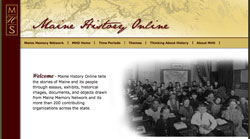
Maine History Online began with the assumption that connecting events and issues among communities, and with regional, national, and international histories, as well as exploring relationships, influence and influences would be crucial to telling the story of Maine. Actions and reactions, along with links and disconnects help to make a place what it is. Connections are as important as uniqueness.
If we limit our vision inward, we miss much of the story. On the television weather forecaster's map, for instance, Maine may look like a solitary outpost at the northeast corner of a vast nation. But life, business, government, war, and peace in Maine never have been limited to – or by – that inaccurate picture of Maine's location.
A more realistic view of the land that came to be know as Maine can be seen from the vantage point of the North Atlantic. Trade winds and trade routes, ocean currents and ocean life, connecting landmasses and proximity to disconnected one – these are the setting for the story of Maine, an area that has played an important, but varying, national and international role for many hundreds of years.
Understanding Maine's history means telling – and re-examining – the best-known stories about the state. It means shifting perspective and point of view to see communities, people, events, and issues in new ways. It means examining the rich primary sources to ask new questions and begin new conversations.
Steering Committee and Advisory Group
Comprising scholars and others with expertise in Maine history, the Steering Committee of Scholars met in several times in 2006 to brainstorm ideas about the stories that are crucial to any examination of Maine history, the themes that should be included, the arrangement of chronological sections, and strategies for including community input into the structure and content of Maine History Online.
In addition, a Board of Advisory Scholars from outside Maine offered advice, feedback, and support to the project.
The committee began with a conviction that it is important to:
- Connect the local (specific) to the state and to the nation
- Keep evidence (primary sources) and interpretation closely linked
- Tell good stories
- Build on people’s sense of a personal connection to history
- Utilize our Contributing Partner relationships to examine local histories
- Keep the website and our structure open-ended, to be able to add and expand
- Present this history in a creative, lively, interactive manner
Steering Committee of Scholars
Ardis Cameron, Professor of American and New England Studies, University of Southern Maine.
Elizabeth De Wolfe, Professor of History and Co-Director of the Women's and Gender Studies Program, University of New England.
James Henderson, retired Maine State Archivist and independent historian.
Richard Judd, Professor of History, University of Maine.
James Leamon, Professor Emeritus of History, Bates College.
Martha McNamara, Director of the New England Arts and Architecture Program at Wellesley College
Neil Rolde, Independent Maine historian.
David Waters, Director of the Center for New England Culture, University of New Hampshire.
Board of Advisory Scholars
Michael Frisch, Professor of History and American Studies, State University of New York at Buffalo.
Harald Prins, Distinguished University Professor of Anthropology, Kansas State University.
Alan Taylor, Professor of History, University of California at Davis.
Alan Trachtenberg, Professor Emeritus of English and American Studies, Yale University.
Laurel Ulrich, 300th Anniversary University Professor, Harvard University.
Authors
Richard W. Judd, the Adelaide & Alan Bird Professor of History at the University of Maine, wrote the Chronological essays.

Judd's primary field of interest is U.S. environmental history, particularly in New England. He earned a PhD from the University of California Irvine in 1979 and has been a faculty member of the UMaine History Department since 1984.
Judd teaches a series of courses concentrated in nineteenth and twentieth century America, including urban history, economic/industrial history, environmental history, and Maine history. He also leads graduate seminars in U.S. history since 1865 and in U.S. environmental history.
Judd is editor of Maine Historical Society's quarterly journal, Maine History, and in conjunction with its publication, offers a graduate practicum in editing and producing a historical journal.
He is the author of numerous article and books, including The Untilled Garden: Science, Religion, and Conservation in America, 1730-1850 (Cambridge University Press, 2009), Natural States: The Environmental Imagination in Maine, Oregon, and the Nation (with Christopher S. Beach; Resources for the Future Press, 2003), Common Lands, Common People: The Origins of Conservation in Northern New England (Harvard University Press, 1997), Maine: The Pine Tree State from Prehistory to the Present (co-edited with Joel Eastman and Edwin Churchill; University of Maine Press, 1995), Socialist Cities: Municipal Politics and the Grass Roots of American Socialism (State University of New York Press, 1979) and Aroostook: A Century of Logging in Northern Maine (University of Maine Press, 1979).
Karen S. Kimball, associate professor of history at the University of Maine at Machias, is the author of the Thematic essays.
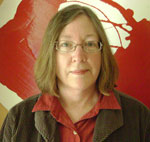
Kimball, who has taught at Machias since 1999, has a Ph.D. in history from Emory University, and an M.A. in History/Historic Preservation from the University of Tennessee. She also has taught at Agnes Scott College in Atlanta and Oglethorpe University in Atlanta.
Her research interests include local and regional history, and she worked for several years on a multi-disciplinary Maine Humanities Council grant-funded study of an African American community in Machias.
In 2004, she was selected for a National Endowment for the Humanities Institute in Regional Studies and the Liberal Arts: Appalachia Up Close. As a result, she created a textile collection, "Appalachian Traces: Landscape Studies in Textiles." It grew out of her comparative study of southern Appalachian coal mining and northern Appalachian lumbering of the late nineteenth and early twentieth centuries. The quilted panels were based on what Kimball learned about those industries and their impact on the environment.
Elizabeth De Wolfe is the author of the Thinking About History essay. She is chair of the Department of History and Co-Director of the Women's and Gender Studies Program at the University of New England, where she joined the faculty in 1996.
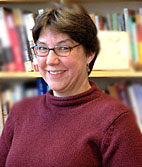
A graduate of Colgate University, she earned a master's degree in Anthropology from the State University of New York at Albany and a Ph.D. in American and New England Studies from Boston University.
De Wolfe's research explores ordinary women who for extraordinary reasons find themselves the subject of public discussion and public print. Her study of the anti-Shaker activist Mary Marshall Dyer, Shaking the Faith, received the 2003 Outstanding Book Award from the Communal Studies Association. Her work on the factory girl Berengera Caswell, The Murder of Mary Bean and Other Stories, received book awards from the New England Historical Association, the Northeast Popular Culture Association, the Independent Publishers Association, and ForeWord Magazine.
She also is the author of Such News of the Land: U.S. Women Nature Writers (UPNE, 2000, with Thomas S. Edwards) and Domestic Broils: Shakers, Marriage and the Narratives of Mary and Joseph Dyer (University of Massachusetts Press, 2010).
Candace Kanes was the editor and curator of the site and author of a number of the exhibits that accompany the essays. She worked at the Maine Historical Society as curator/historian for Maine Memory Network from 2003 - 2015.

She holds a Ph.D. in modern American history from the University of New Hampshire and a master's in American and Women's Studies from the State University of New York at Buffalo.
Among her publications are "Serious and Ambitious Career Women: The Portland Business and Professional Women's Club in the 1920s" in Marli F. Weiner, ed., Of Place and Gender, Women in Maine History (Orono: University of Maine Press, 2005); and "Revisiting Main Street: Uncovering Women Entrepreneurs," in Polly Welts Kaufman and Katharine T. Corbett, eds., Her Past Around Us: Interpreting Sites for Women’s History (Malabar, Florida: Kreiger Publishing Co., 2003).
She has taught history, American studies and women's studies at Bates College, the University of New England, University of Southern Maine, and Maine College of Art. She is a former newspaper editor and reporter and has worked at The Times Record in Brunswick and the Lewiston Sun-Journal and at newspapers in Ohio.
The Essays

The essays that anchor each Time Period, each Theme, and the Thinking About History section provide an overview of the topic or time period, set the context, and provide the jumping off point for further inquiry by the reader.
The essays do not cover every event, issue, or important individual in Maine history. Rather, they give a sense of some of the topics in the state's history that help explain trends and connections, and they serve as context for better understanding the online exhibits that accompany them as well as the many thousands of individual items on Maine Memory Network.
The essays, like the exhibits, also connect Maine's story to that of the region, of the nation, and, when appropriate, of the world. Studying any history – family, local, state, region, or nation – without considering the larger picture of history, can bring an incomplete and distorted view of the past.
To improve readability, we chose to forego footnotes or endnotes. A bibliography of sources for the site can be accessed from the bottom of the sidebar on each page.
In addition, we made several style choices to aid readability. We generally use a "down" style, capitalizing words only when necessary, avoiding unnecessary punctuation, and using numerals instead of text for many numbers.
The Exhibits
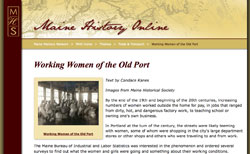
Topics for online exhibits that accompany each section were prompted by the text in the essay as well as by the comments and suggestions made at meetings held around the state in the summer and fall of 2007.
The exhibits tell stories, sometimes providing details to add to information in an essay, sometimes offering a interesting or unusual snapshot of a topic, a person, or an event that helps to make Maine history uniquely Maine.
Contributing Partners, the essay authors and the Maine Memory Network Curator wrote the exhibits.
While we do not anticipate adding essays, new exhibits are planned and encouraged. Contributing Partners who have ideas about exhibits to accompany any essay can contact info@mainememory.net to discuss topics and how to begin the process of creating the exhibit.
Structure of MHO
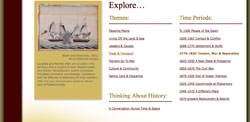
The Homepage of Maine History Online (MHO) can be found by clicking on the Maine History Online logo on the homepage of Maine Memory Network. It also can be accessed by going to: https://www.mainememory.net/mho/
Users can move through the site by employing the navigation at the top or bottom of the page. It will allow a user to move from an essay to an MHO exhibit, then back to essay, or, using the drop-down menu, choose a different essay in the same section or a different section.
Navigation also enables movement back to Maine Memory Network.
Use the Search link on the navigation bar to search within the essays and exhibits. Search by keyword for names, locations, events, or other terms. It will search all of Maine History Online.
To print essays, click on the "print version" link at the top of the essay. This will open another version of the essay on one page that you can print, without illustrations. To print each page, with illustrations, use your browser's print option.